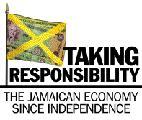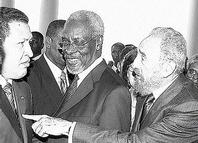

Cuban President Fidel Castro (right), makes a comment to Venezuelan President Hugo Chávez (left), much to the amusement of Prime Minister P.J. Patterson. The state heads were enjoying a moment in between sessions while at the second PetroCaribe summit at the Ritz-Carlton hotel in Montego Bay in September last year. - Contributed
How does the credit from the concessionary oil deal granted under the PetroCaribe agreement compare to the economic benefits of a friendly relationship with the United States?
In assessing the impact of Jamaica's external relations on the economy, the external environment group of the Jamaica Economy Project has so far tentatively arrived at two main suggestions.
Firstly, given our geographical location and our disadvantageous position in the global division of labour and the international production hierarchy, our most pragmatic diplomacy with regard to our economy could simply be not displeasing the large economies that would stand to offer us the greatest degree of integration. These are namely the United States and Canada.
Particularly with regard to the United States, our economic growth indicators ostensibly bear a positive relationship with the degree of cordiality in our relationship. When we were 'with the West' in the 1960s, we benefited from healthy bauxite exports and tourist arrivals, and our economic growth indicators were the healthiest they have ever been.
Correlation
In the 1970s, we sought not only greater international autonomy but a leadership role, particularly among developing countries via the Non-Aligned Movement.
In so doing, we alienated the United States, and our economic growth figures dipped, in part a result of lower levels of foreign direct investment as well as the dip in North American tourist arrivals.
When we re-established a positive relationship with the Reagan administration, our numbers turned up again.
We can, at least in part, account for this with the initial positive results of the Caribbean Basin Initiative and the resurgence in investor confidence.
And as for the 1990s to date, while our relationship is by no means hostile, it is certainly not what one would call chummy, and our economic growth has been flat.
Granted, this admittedly simple correlation cannot stand alone; there are other complex explanatory factors. Indeed, this is the task of the Jamaica Economy Project - to uncover all the factors that explain our dismal economic performance over the decades since independence.
There were, arguably, gains from
the friendships we made during the 1970s: our economy didn't lose entirely from our efforts to chart a more autonomous path in our foreign relations. With regard to inputs that benefited our economy we would consider the technical assistance and scholarships from Eastern European countries that were then under the yoke of the Soviet Union.
As just a sample we know that in 1975 Cuba offered 183 scholarships to Jamaicans, in 1976 a total of 1,133 scholarships were awarded from all bilateral diplomatic partners, and in
1978-9 520 scholarships were awarded to Jamaicans from Soviet Bloc countries alone. These scholarships in the areas of medicine, engineering, and other technical areas benefited the recipients, and the organisations they returned to, which in many cases was the civil service.
One might perhaps argue that there was also a trickle down effect from the added intellectual capital that those recipients brought with them on their return home.
'70s activism
One could also posit that the goodwill, or the international political capital that Jamaica gained from its diplomatic efforts of the 1970s, is simply not quantifiable, particularly in just a few decades. However we might interpret our current friendly relations with rising powers such as Brazil, South Africa and especially China, and the prospect of co-operation that could lead to economic benefits as the outcome of our '70s activism. Nevertheless, our concern here is trying to measure, as best as possible, the impact on economic growth, and so these arguments, while valid, are difficult to quantify.
Our second suggestion is that we must come to terms with the losses we have incurred by maintaining the preferential agreements that sustain our otherwise doomed primary agricultural products. When the LomConvention was signed in 1975, it was considered Caribbean diplomacy's finest hour. Here was a small group of young island states winning, on behalf of other developing countries, important and meaningful concessionary trade deals with European powers.
It might have been more prudent if the original purpose of the Convention had been interpreted as giving those of us whose economies were dominated by unprofitable agricultural production some breathing room and some aid to diversify out of those crops, as other countries, such as Mauritius, have done.
There is a huge opportunity cost to our indisputable failure to diversify. If there are cases where attempts at diversification took place, why have they not borne fruit?
Diversification
While it is near impossible to measure what could have been, we can see what Mauritius did in very similar circumstances to those of Jamaica (and other Caribbean islands).
Mauritius diverted investment from the agricultural sector into the manufacturing sector by offering tax incentives and financing opportunities for both local and foreign investors, including unsecured loans to domestic entrepreneurs, particularly in the field of small-scale export agriculture and manufacturing. The modernisation and diversification policy implemented within the agricultural sector was directed not only at sugar, but brought about new crops such as tea, tobacco, lychees, mangoes and flowers, as well as fisheries. Efforts were also made to reduce the number of large sugar estates, with some success.
Further, we have spent huge amounts of our diplomatic resources on maintaining these preferential trade agreements. First we need to tally the actual dollar amounts spent on the staffing, training, travelling and other expenses of the various negotiating teams over the past 30 years. For small developing countries like Jamaica these costs can add up to not insignificant proportions of the national budget. There is also the question as to why negotiations efforts were not correlated with local production and service delivery possibilities, particularly in new agricultural production sectors, so that agreements could be more aptly tailored to actual domestic needs for market access.
On the opposite end, why weren't domestic agricultural, manufacturing and investment policies structured to take advantage of the aid component opportunities of the preferential agreements?

